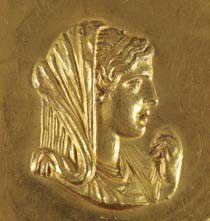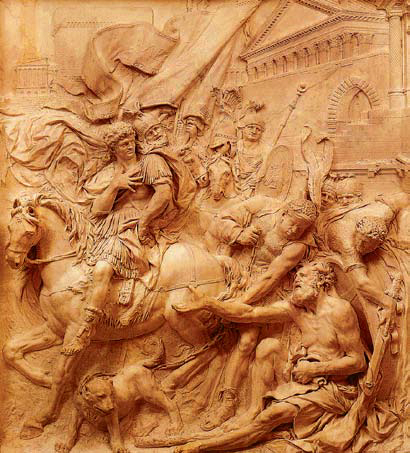Straight away Alexander, as the new king, went South, he repressed and found the chance, after Philip’s murder and the power that was created, to gain their autonomy. At the conference “of the Public” of the Greeks, at Corinth, he showed his capabilityand persuaded all the Greeks on an expendition against Persia.
At Corinth, Alexander meets philosopher Diogenis. He was stunned with his wisdom and his purity, as much as his endless search for light, the truth and exclaimed “If I were not a king, I would like to have been Diogenis”.
His meeting with Diogenis and the messages he got from their conversation would accompany him all his life. It would give him strength

Olympiada
during difficult times during war, political confliction, in his creation of his new and enormous kingdom. He would have as guidance in his life, the humbleness and decency of Diogenis. Diogenis slept on straw and drank water with his hands.
Moreover he was set an example from his teacher Aristoteli and Leonidas, relative of Olypiada who searched his students private possessions, made Olypiada hide forbidden provision at one time they scolded him because he threw plenty of incense on the dirt. Alexander loved him dearly that’s why when the student became ruler of the world, he sent him 16 tons of incense from Egypt.
But Alexander did not only have Greece in his mind. In his thoughts his father’s plan was there, now as a king, he himself understood it better and complete. Thus he got ready for a campaign in Asia. In 335, Alexander started off for Thrace, so that he could repress for a rebellion of Illirion and Trivallon. His success was based on his military superiority. His campaign to Thrace controlled two coasts of Ellispontos, a significant region up to now, for politics, economy, growth of trade and sea trade and suppliment for the army.

Alexander and Diogenis
At the same time, Alexander’s fleet reached Dounavi and conquered the whole of Efxeinos Ponto. The conquered cities kept their autonomy but Alexander followed his father’s policies, respected the local morals and supported them economically. This was his first advice to freedom of the people and the cities, respect of the cultures, their development as to their economy for the survival of the locals as for the kingdom. In continuation Alexander drove his army to Agriandon (today’s Sophia) and Paionia (today’s Skopje) as it prevaled.
The news for the new revolution reached Thiva, whereas the false news about Alexander’s murder spread. Alexander commanded 3.000 riders and 30.000 soldiers to conquer Thiva and punish the rebels. The Thivians had violated all the codes of “The Greek Public” they regarded them as tyrants, and had killed the members of the Macedonian guard.
In spite of the insult Alexander showed modesty and forgave some of the rebels from other cities and from Thiva that had rebelled.
The descendants of Philip, Alexander and the diplomatic friends of Philip, Alexander and the Macedonians, the priest and Timoklea were saved. At that time the desire to have peace within Greece was stronger, but the continuation of the alliance of the Greek cities, with Macedonian and their assistance in war against Persia. Alexander’s return to Macedonia meant the beginning for preparation for the campaign to Asia, but the chances for celebrations showed success, they increased the prestige and glamour of the kingdom.


